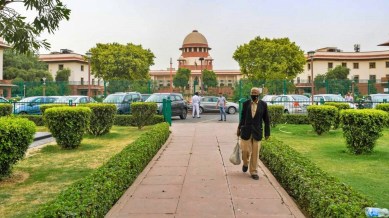Stay updated with the latest - Click here to follow us on Instagram
Centre urges Supreme Court to modify its 2012 order in 2G case
The Centre’s plea sought allowing the allocation of spectrum through administrative process in accordance with law.

The Centre has moved the Supreme Court seeking modification of its February 2012 judgment in the 2G case, which directed that allocation of mobile 2G spectrum should be done through auction.
The Centre’s plea sought allowing the allocation of spectrum through administrative process in accordance with law.
monthly limit of free stories.
with an Express account.
In its petition, the Centre said that pursuant to the judgment, assignment of Mobile Access spectrum to telecommunication service providers has been undertaken by the Department of Telecommunications on the basis of regular spectrum auctions.
On Monday, Attorney General R Venkataramani, appearing for the Centre, mentioned an interim application before a bench of CJI D Y Chandrachud and Justice J B Pardiwala.
The plea said, “however…the assignment of spectrum is required not only for commercial telecommunication services, but also for non-commercial use for the discharge of sovereign and public interest functions such as security, safety, disaster preparedness, etc.” which “would squarely fall within the scope of subserving the common good”.
“There are also specific sui generis categories of usage, including commercial use of spectrum where, technical and economic conditions of the use affect the feasibility of auction as a means of assignment of spectrum and thus auction as the exclusive mode may present some issues in the relevant assignment,” it stated.
The “assignment”, it pointed out “may require to be undertaken administratively due to economic conditions such as demand being lower than supply or due to technical conditions such as spectrum for space communication, where it would be more optimal and efficient for spectrum to be shared by multiple players, rather than being broken up into smaller blocks for sole purpose of exclusive assignment by auction”.
The government said there is an urgent requirement for the SC “to clarify that in the situations specified… and other similar circumstances, the assignment of spectrum through administrative process may be undertaken if so determined through due process in accordance with law, if such assignment is in pursuit of governmental functions, or public interest so requires, or auction may not be preferred due to technical or economic reasons”. The plea said “that this will be crucial for achieving the objectives of national security, safety, and disaster preparedness, as well as enabling the Union of India to undertake dynamic decisions as may be required, to realise the full potential of telecommunications, to best subserve the common good”.
The SC in February 2012 had quashed the 2G licences granted to different companies by then UPA government.
The Centre pointed out that the SC while answering a presidential reference in September 2012 had however said that the use of the term perhaps in the February judgement “suggests that the recommendation of auction for alienation of natural resources was never intended to be taken as an absolute or blanket statement applicable across all natural resources, but simply a conclusion made at first blush over the attractiveness of a method like auction ni disposal of natural resources. The choice of the word ‘perhaps’ suggests that the learned Judges considered situations requiring a method other than auction as conceivable and desirable”.